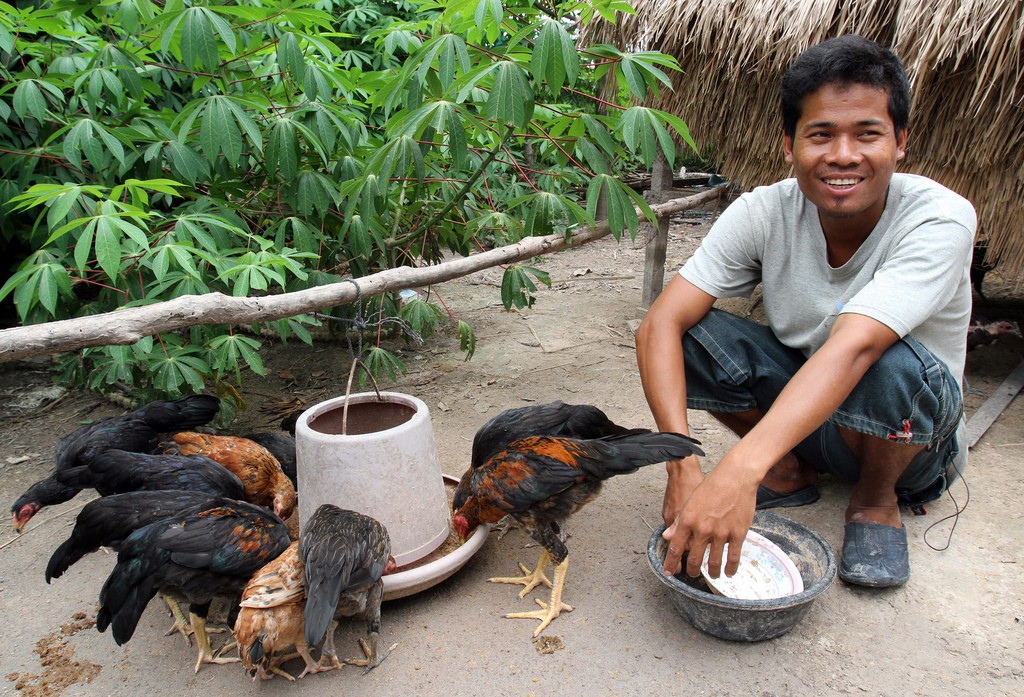វិមជ្ឈការ និងវិសហមជ្ឈការ ត្រូវបានគេមើលឃើញថាជា កំណែទម្រង់ “ចេញពីឆន្ទះ”1 ដែល រដ្ឋាភិបាលជាតិ ធ្វើការផ្ទេរអំណាច ជាដំណាក់ៗ ទាំងអំណាចហិរញ្ញវត្ថុ ឬអំណាចរដ្ឋបាល ទៅឱ្យ រដ្ឋបាលមូលដ្ឋាន ដើម្បីគ្រប់គ្រងកិច្ចការក្នុងតំបន់របស់គេ។

ស៊ុន សុវ៉ាត់ អាយុ ២៧ឆ្នាំ ទ្រទ្រង់គ្រួសាររបស់លោក ដោយការចិញ្ចឹមមាន់ នៅខេត្តកំពង់ធំ ប្រទេសកម្ពុជា។ រូបថត ថតដោយ ធនាគារពិភពលោក កាលពីថ្ងៃទី ១៧ ខែកក្កដា ឆ្នាំ២០១៣។ ក្រោមអាជ្ញាប័ណ្ណCC BY-NC-ND 2.0
កំណែទម្រង់តាមបែបប្រជាធិបតេយ្យនេះ បានចាប់ផ្តើមឡើងពីរដ្ឋបាលដែនដីថ្នាក់ទាបបំផុត ឃុំ-សង្កាត់ ទៅរដ្ឋបាលដែនដីខ្ពស់បំផុត រាជធានី ខេត្ត ក្រុង ស្រុក និងខណ្ឌ។ វឌ្ឍនភាពនៃកំណែទម្រង់នេះ ត្រូវបានគូសបញ្ជាក់ជាមួយនឹង ការបង្កើតគណៈកម្មាធិការជាតិសម្រាប់ការអភិវឌ្ឍតាមបែបប្រជាធិបតេយ្យនៅថ្នាក់ក្រោមជាតិ (គ.ជ.អ.ប) នៅឆ្នាំ២០០៨។
កំណែទម្រង់តាមបែបប្រជាធិបតេយ្យនៅរដ្ឋបាលមូលដ្ឋាន គឺជាលទ្ធផលនៃប្រវត្តិជោគជ័យពីការអនុវត្តគម្រោងល្បីមួយដែលត្រូវបានគេស្គាល់ថា “សីលា”។ ចាប់ពីឆ្នាំ១៩៩៦ ដល់ឆ្នាំ២០០០ គម្រោងនេះ ត្រូវបានយកទៅអនុវត្តនៅតាមបណ្តាឃុំ-សង្កាត់ខ្លះ នៅក្នុងខេត្តគោលដៅមួយចំនួន សំដៅដោះស្រាយតម្រូវការនៅតាមទីជនបទដោយប្រសិទ្ធិភាព ដោយការផ្ទេរទៅឱ្យរដ្ឋបាលមូលដ្ឋាន នូវធនធានហិរញ្ញវត្ថុ និងអំណាចធ្វើសេចក្តីសម្រេចចិត្ត។2 ជាលទ្ធផល គម្រោងសាកល្បងនេះ បានបើកផ្លូវសម្រាប់ការអភិវឌ្ឍច្បាប់ស្តីពីការគ្រប់គ្រងរដ្ឋបាលឃុំ-សង្កាត់ និង ច្បាប់ស្តីពីការគ្រប់គ្រងរដ្ឋបាលរាជធានី ខេត្ត ក្រុង ស្រុក ខណ្ឌ នៅឆ្នាំ២០០២ និងឆ្នាំ២០០៨ តាមលំដាប់លំដោយ។3
នៅខែ ឧសភា ឆ្នាំ២០០១ គណៈកម្មាធិការជាតិសម្រាប់គាំទ្រឃុំ/សង្កាត់ ត្រូវបានបង្កើត ឡើង។4 គណៈកម្មាធិការនេះ ជួយឃុំ-សង្កាត់ ក្នុងការអនុវត្តច្បាប់ស្តីពីរដ្ឋបាលឃុំ-សង្កាត់ និងប្រឹក្សាក្រសួងមហាផ្ទៃ និងរាជរដ្ឋាភិបាលកម្ពុជា ដែលជាអង្គនីតិប្រតិបត្តិ អំពីការរៀបចំ និងការអនុវត្តគោលនយោបាយវិមជ្ឈការ។5 ទើបតែមកដល់ឆ្នាំ២០០៨ ប៉ុណ្ណោះ បន្ទាប់ពីកំណែទម្រង់វិមជ្ឈការត្រូវបានពង្រីកវិសាលភាពទៅដល់រាជធានី ខេត្ត ក្រុង ស្រុក ខណ្ឌ គណៈកម្មាធិការជាតិសម្រាប់ការអភិវឌ្ឍតាមបែបប្រជាធិបតេយ្យនៅថ្នាក់ក្រោមជាតិ ត្រូវបានបង្កើតឡើង ដើម្បីអនុវត្តច្បាប់ និងគោលនយោបាយស្តីពីវិមជ្ឈការ និងវិសហមជ្ឈការ នៅគ្រប់កំរិតនៃរដ្ឋបាលមូលដ្ឋាន។6
នៅក្នុងរយៈពេល ១០ឆ្នាំចុងក្រោយនេះ រាជរដ្ឋាភិបាល និងក្រសួង បាននិងកំពុងផ្ទេរសិទ្ធិអំណាចខាងហិរញ្ញវត្ថុ និងរដ្ឋបាល ទៅរដ្ឋបាលមូលដ្ឋាន។ នៅរៀងរាល់ ៥ឆ្នាំ ធនធានមកពីថវិកាជាតិ ត្រូវបានផ្ទេរទៅមូលនិធិឃុំ-សង្កាត់ និងមូលនិធិក្រុង-ស្រុក។7 នៅឆ្នាំ២០១០ ក្រសួងពាណិជ្ជកម្ម បានផ្ទេរភារកិច្ចនៅក្នុងវិស័យពាណិជ្ជកម្ម ទៅក្រុង និងស្រុកគោលដៅ នៅក្នុងការចេញអាជ្ញាប័ណ្ណ សម្រាប់ប្រតិបត្តិការពាណិជ្ជកម្ម និងសេវាកម្ម។8 នៅពេលថ្មីៗនេះ នៅខែមីនា ឆ្នាំ២០១៥ ក្រសួងសុខាភិបាល បានផ្ទេរភារកិច្ចនៅក្នុងវិស័យសុខាភិបាល ទៅក្រុងនិងស្រុក នៅក្នុងការផ្តល់សេវាសាធារណៈរបស់ក្រសួង។9 បួនខែក្រោយមក ក្រសួងមហាផ្ទៃ បានផ្ទេរភារកិច្ចរបស់ក្រសួង នៅក្នុងការប្រមូលចំណូលបានមកពីសេវាសាធារណៈលើកិច្ចការស្ថិតិប្រជាពលរដ្ឋ ទៅស្នងការដ្ឋាននគរបាលរាជធានី និងខេត្ត នៅតាមបណ្តារាជធានី និងខេត្ត។10
“ច្រកចេញចូលតែមួយ“ ដែលជាយន្តការសម្រាប់ការផ្តល់សេវាសាធារណៈ ប្រកបដោយប្រសិទ្ធភាពនិងទាន់ពេលវេលា ត្រូវបាននាំយកទៅអនុវត្តមុខងារខាងសេវារដ្ឋបាលមួយចំនួនដែលបានការផ្ទេរអាណត្តិពីរាជរដ្ឋាភិបាល និងក្រសួង។11 ហេតុនេះ ការិយាល័យច្រកចេញចូលតែមួយ ត្រូវបានបង្កើតឡើងនៅគ្រប់សាលាស្រុក-ខណ្ឌ ដែលជាទីកន្លែងប្រជាពលរដ្ឋអាចទទួលបានឯកសារសំណុំបែបបទគ្រប់ប្រភេទ និងព័ត៌មានពេញលេញស្តីពីការផ្តល់សេវាសាធារណៈគ្រប់ប្រភេទ បន្ទុកសេវា និង តម្លៃពាក់ព័ន្ធនៅគ្រប់វិស័យ។12 ស្របពេលជាមួយគ្នានេះ ការិយាល័យស៊ើបអង្កេតទទួលពាក្យបណ្តឹង ត្រូវបានបង្កើតឡើង ដើម្បីទទួលបណ្តឹង និងផ្តល់ព័ត៌មានភាពមិនប្រក្រតី និងភាពខ្វះខាត ប្រព្រឹត្តដោយបុគ្គលិកនៃរដ្ឋបាលស្រុក-ខណ្ឌពាក់ព័ន្ធ ចំពោះអ្នកទទួលសេវាសាធារណៈ។13
បើទោះជាមានវឌ្ឍភាពនៃកំណែទម្រង់វិមជ្ឈការ និងវិសហមជ្ឈការ គួរជាទីកត់សម្គាល់យ៉ាងណា សេចក្តីព្រួយបារម្ភនៅតែមាន។ ការចូលរួមតិចតួចពីប្រជាជន កង្វះសមត្ថភាពរដ្ឋបាល សមត្ថភាពយែនឌ័រមានកំរិត ហិរញ្ញវត្ថុមិនគ្រប់គ្រាន់ និងអវត្តមាននៃពហុភាព នៅតាមភូមិ គឺជាអ្វីដែលអ្នកសិក្សាស្រាវជ្រាវ និងអង្គការមិនមែនរដ្ឋាភិបាល គិតថាអាចធ្វើ ឱ្យប៉ះពាល់ដល់ផ្លែផ្កាពេញលេញនៃកំណែទម្រង់នេះ នៅប្រទេសកម្ពុជា។14
ទាក់ទងនឹងវិមជ្ឈការ និងវិសហមជ្ឈការ
បច្ចុប្បន្នភាពចុងក្រោយ ថ្ងៃទី ២៨ ខែកញ្ញា ឆ្នាំ២០១៥
ឯកសារយោង
- 1. Joakim Öjendal & គិម សេដារ៉ា. “តើជាប្រជាធិបតេយ្យូបនីយកម្ម ពិតប្រាកដទេ? ការពិនិត្យលើបទ ពិសោធន៍អំពីសក្តានុពលនៃកំណែទម្រង់វិមជ្ឈការ.” មជ្ឈមណ្ឌលអន្តរជាតិដើម្បីប្រជាធិបតេយ្យមូលដ្ឋាន (ICLD) ឯកសារលេខ ០៩ (ឆ្នាំ២០១១): ទំព័រ ១-២។ ចូលអាននៅថ្ងៃទី ៩ ខែកញ្ញា ឆ្នាំ២០១៥។ http://gup.ub.gu.se/publication/136755-real-democratization-in-cambodia-an-empirical-review-of-the-potential-of-a-decentralisation-reform
- 2. បុគ្គលិកសារព័ត៌មានភ្នំពេញប៉ុស្តិ៍. “សីលា ផ្តល់ឱកាសឱ្យប្រជាជនដឹកនាំខ្លួនឯង.” ភ្នំពេញប៉ុស្តិ៍ ចុះថ្ងៃទី ១៥ ខែកញ្ញា ឆ្នាំ២០០០។ ចូលអាននៅថ្ងៃទី ៩ ខែកញ្ញា ឆ្នាំ២០១៥។ http://www.phnompenhpost.com/national/seila-seeks-give-people-selfgovernment . សម្រាប់សិក្សាបន្ថែម Henny Andersen. យន្តការវិមជ្ឈការឈ្ពោះទៅការអភិវឌ្ឍជនបទ និងកាត់បន្ថយភាពក្រីក្រ. ធនាគារអន្តរជាតិសម្រាប់ការកសាងឡើងវិញ និង អភិវឌ្ឍន៍: ឆ្នាំ២០០៤។ ចូលអាននៅថ្ងៃទី ៩ ខែកញ្ញា ឆ្នាំ២០១៥។ http://documents.worldbank.org/curated/en/990781468231553040/Cambodias-Seila-program-a-decentralized-approach-to-rural-development-and-poverty-reduction
- 3. ខុមហ្វ្រែល. ការវាយតម្លៃវិមជ្ឈការនៅកម្ពុជា ដំណាក់កាលទី២: ការអនុវត្តរបស់ក្រុមប្រឹក្សាឃុំ និងការចូលរួមរបស់ប្រជាពលរដ្ឋ ឆ្នាំ២០០៧-ឆ្នាំ២០១២. រាជធានីភ្នំពេញ: ខែកុម្ភៈ ឆ្នាំ២០១៣ ទំព័រ៣។ ចូលអាននៅថ្ងៃទី ៩ ខែកញ្ញា ឆ្នាំ២០១៥។https://comfrel.org/wp-content/uploads/2014/05/909290Final_Report_of_the_Second_Term_of_D_D_Khmer.pdf
- 4. ព្រះរាជក្រឹត្យ លេខ នស/រកម/០៥០១/១៧៥ ស្តីពីការបង្កើតគណៈកម្មាធិការជាតិគាំទ្រឃុំ-សង្កាត់ ចុះថ្ងៃទី ១៨ ខែ ឧសភា ឆ្នាំ២០០១។
- 5. ដូចខាងដើម មាត្រា៣។
- 6. ព្រះរាជក្រឹត្យ លេខ នស/រកម/១២០៨/១៤២៩ ស្តីពីការបង្កើតគណៈកម្មាធិការជាតិសម្រាប់ការអភិវឌ្ឍតាម បែបប្រជាធិបតេយ្យនៅថ្នាក់ក្រោមជាតិ ចុះថ្ងៃទី ៣១ ខែធ្នូ ឆ្នាំ២០០៨។ ព្រះរាជក្រឹត្យ លេខ នស/រកម/ ១០១៤/១១៧៤ ស្តីពីកែរសម្រួលនិងបន្ថែមសមាសភាពថ្មី នៃគណៈកម្មាធិការជាតិសម្រាប់ការអភិវឌ្ឍតាមបែបប្រជាធិបតេយ្យនៅថ្នាក់ក្រោមជាតិ ចុះថ្ងៃទី ០៦ ខែតុលា ឆ្នាំ២០១៤។
- 7. អនុក្រឹត្យ លេខ ៤៥៦ ស្តីពីការផ្ទេរធនធានពីថវិកាជាតិ ទៅមូលនិធិឃុំ-សង្កាត់ ចុះថ្ងៃទី ១១ ខែកក្កដា ឆ្នាំ២០១៣។ អនុក្រឹត្យ លេខ ៣៤២ ស្តីពីការផ្ទេរធនធាន ពីថវិកាជាតិ ទៅមូលនិធិក្រុង-ស្រុក ចុះថ្ងៃទី ៣១ ខែធ្នូ ឆ្នាំ២០១៤។
- 8. ប្រកាស ក្រសួងពាណិជ្ជកម្ម លេខ១៦៨/២០១០ ស្តីពីការធ្វើប្រតិភូកម្មកិច្ចការពាណិជ្ជកម្មទៅទីក្រុង និងស្រុកគោលដៅ ចុះថ្ងៃទី ១០ ខែវិច្ឆិកា ឆ្នាំ២០១០។
- 9. ប្រកាស ក្រសួងសុខាភិបាល លេខ០៧៧ ស្តីពីការធ្វើប្រតិភូកម្មមុខងារក្នុងវិស័យសុខាភិបាល ទៅរដ្ឋបាលថ្នាក់ក្រោមជាតិ នៅក្នុងការផ្តល់សេវាសាធារណៈរបស់ក្រសួងសុខាភិបាល ចុះថ្ងៃទី ២០ ខែមីនា ឆ្នាំ២០១៥។
- 10. ប្រកាស ក្រសួងមហាផ្ទៃ លេខ៦០៤៩ ស្តីពីការធ្វើប្រតិភូកម្មមុខងារសេវាសាធារណៈ និងអត្ថប្រយោជន៍ស្តីពីស្ថិតិប្រជាពលរដ្ឋ ចុះថ្ងៃទី ០១ ខែកក្កដា ឆ្នាំ២០១៥។
- 11. សេចក្តីសម្រេច នៃរាជរដ្ឋាភិបាលនៃព្រះរាជាណាចក្រកម្ពុជា លេខ ១២ សសរ ស្តីពីការបង្កើតការិយាល័យច្រកចេញចូលតែមួយ និង ការិយាល័យស៊ើបអង្កេតទទួលពាក្យបណ្តឹង នៅថ្នាក់ស្រុក-ខណ្ឌ ចុះថ្ងៃទី ៣០ ខែមិថុនា ឆ្នាំ២០០៨។
- 12. ដូចខាងដើម, មាត្រា២។
- 13. ដូចខាងដើម, មាត្រា៣។
- 14. ដូចខាងដើម ត្រង់កំណត់យោងទី១ Joakim Öjendal & គិម សេដារ៉ា ទំព័រ១៤។ ដូចខាងដើម ត្រង់កំណត់យោងទី៣ ខុមហ្វ្រែល ទំព័រ២៦។

